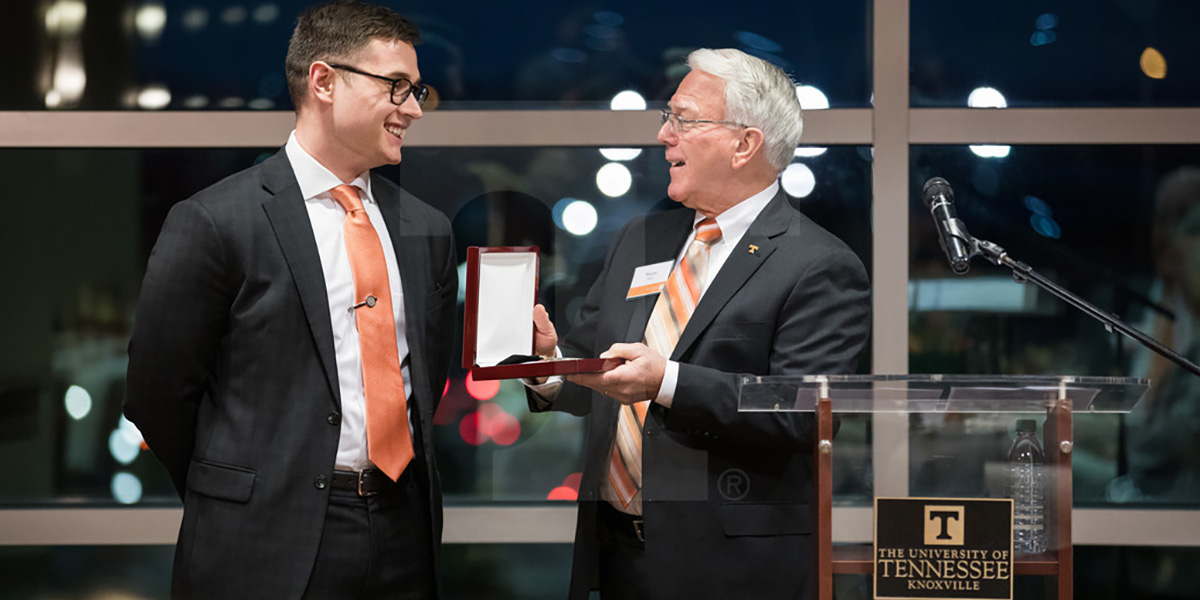Written by Grant Rigney
Haslam Scholars Program, 2019
The finalist interview for the Rhodes Scholarship is notorious for catching candidates off guard. It’s the kind of interview where, during the cocktail party the night leading up to what you think is the actual interview, a world-renown scientist will question your life plans as if they were a thesis defense. Thus, I expected my weekend in Chicago to be riddled with mishaps and cringe-worthy moments, and it was. I arrived in the lobby for the cocktail party and, to my surprise, found everyone carrying a sealed envelope. When I asked where I could pick mine up, one girl replied, “oh these are the signed transcripts you were supposed to bring.” Then another looked at me and all but said “you’re done – next.” I smiled at them, laughed, and said “well, they are either going to disqualify me now, or they won’t care at all!” I was betting on the latter.

Grant receiving recognition for the Rhodes from Interim Chancellor Wayne Davis
When we arrived in the seventh-floor conference room, our interviewers were waiting. The chair of the committee asked us for our transcripts, and I quickly found my way to the back of the line. When everyone else had turned them in, I smiled at her and apologized, saying I had forgotten to bring them. She smiled back and said, “it’s okay sweetie, we only need them if you win.” I smiled and breathed a sigh of relief. I wouldn’t need them. I walked out of the interview in one piece and with absolutely no expectations of winning the scholarship. Honestly, I was just honored and excited to be going through the process.
After everyone had finished interviewing, we gathered in a conference room with a table for twelve. The committee asked us to wait while they deliberated to select the two winners. After playing banana grams, watching the office, playing Mario cart, and chatting with new friends for three and a half hours, the committee reemerged. I had few butterflies in my stomach because I had few expectations for winning the scholarship. After all, I was surrounded by some of the most amazing students I had ever met. After the committee chair announced that I had won, I was literally speechless. One girl came up to me and said, “congratulations, it is well-deserved,” to which I accidentally responded, “you too!” After the other finalists left, we received some paperwork, shook hands with and thanked the interviewers, and left. It was time to be grateful and get to work.
After being chosen for the scholarship, I had some time to reflect on what contributed to my selection and what it means to be a Rhodes Scholar. The motto and charge of the Rhodes Trust is to “Stand Up for the World.” This brings to mind a sense of camaraderie, interlocked arms fighting for something worthwhile – an end to starvation and food insecurity, healthcare inequality, racism, sexism, and all forms of injustice. When this is juxtaposed to the pillars of the Haslam Scholars Program, it is easy to see how HSP shaped my character and future plans to fit in with those of the Rhodes Trust.

Rigney and other members of the 2015 Haslam Scholars cohort atop Arthur’s Seat
The Haslam Scholars Program seeks to select and develop students who want to make a difference. Regardless of individual field, the program designs courses, community service opportunities, and a study abroad to encourage students to look beyond their own personal snow globe of experiences. If this process is trusted and sought after, the end effect is that we – emerging humanists, scientists, activists – have the privilege of peering into the snow globe of someone different than ourselves. This willingness to listen to someone else is where the seedlings of community are planted and nourished. And when full grown, these seeds bear fruit to people who want to stand up for the world together, for people who are struggling, suffering, and are often forgotten. Evidence of this is found in the pillars of our program; diversity, integrity, justice, and responsibility form the foundation of the work that scholars pursue for the rest of their lives. This is what prepares us to do great things, and, hopefully, what the Rhodes Trust saw in my application. If this is the case, much of my success is due to the opportunities the Haslam Scholars Program placed in front of me, its staff, and the mentorship that filled the gaps along the way.
Being grateful for what the Haslam Scholars Program and the Rhodes Trust have given me is an active rather than a passive process; it is a prescription to pay the generosity forward. Although I may not have the resources to pay for someone else’s education, I do have the ability to apply the pillars of the Haslam Scholars Program to my life beyond UT. In so doing, my hope for my time at Oxford, and indeed for my life as a physician, is to be full of integrity, contribute to a diverse world, be equitable with the resources I have, serve those around me selflessly, and pursue excellence in all my endeavors for the good of humankind.
